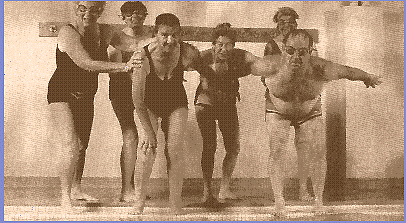

DARGA......What does it mean?
The book "Nazwiska Polakow" by Kazimierz Rymut (1991) states:
DARGA - Most likely derives from the same root seen in the verb "dziergac~", to embroider, border, crochet. But could also come in some cases from the word "darga," meaning fishing-pole. This may be a dialect term. To add some weight to this interpretation, Adam Fischer writes in The Cassubian Civilization (1935), that many local group names among the Kashube derive from their type of dress and nicknames.
DARG-, in Pomeranian and especially Kashubian names, the -AR- is often the same as -RO- in standard Polish. Specifically mentioned is DARGOSLAW, DARGOTA as examples. It is quite possible DARGA could have been much the same as DROGA or DROGO in standard Polish, i.e., "dear one." This derivation is another possibility.
![]()
Claim a DARGA, Win a Prize.
Anything familier here........?
The earliest I currently have on the DARGA line starts with Joseph Darga, my Great Great Grandfather.
Joseph Darga, died 1892/1893?, married to Josephine Haas. Lived in Werblin, West Prussia near Danzig, Germany (now Gdansk, Poland). They had eleven children: Josephine, Annie, Agrippina, Yety, Francesca, Otilla, Julius, Joseph Michael, Teofiel (Theophil), Anthony and Theodore.

(1) Joseph Michael Darga born 11 Sep 1860 in Werblin, West Prussia. Came to U.S. with family in 1890. Died 1 Mar 1939 in Detroit, Michigan. Married to Louise (Ludovica) Krause. Their children were: Anna, Conrad, Joseph Michael (jr), Pauline, Francis (Frank), Lillian and Mary. Joseph Michael Darga brought his family to the U.S. on the S.S. Karlsruhe. They left from the Port of Bremen and first stopped in New York on 10 April 1890. The following day, 11 April 1890, they arrived in Baltimore. Joseph was 30 years old at this time. He traveled with his wife Louise (age 24), daughter Anna (age 2 months) and son Conrad (age 2). Conrad, it is said, died aboard ship. However, I have not been able to confirm this from the ship's passenger list. A female named Julianne (age 22) was with them, her relationship as of yet, unknown (Joseph's sister?). Who is Julianne? Email me at twdarga@yahoo.com if you have information.
(2) Theodore Darga born 16 Mar 1869 in Werblin, West Prussia. Lived in Detroit for a couple of years. Married Mary Wasinski in Detroit, Sept 29, 1890. Moved to Milwaukee, Wisconsin in 1894, worked as a Tailor. In 1905, he moved to Beaver, Wisconsin where he became a farmer.
Theodore died November 16, 1949 in Beaver, Wisconsin.
Theodore & Mary had eleven children: Frank, Helen, Leo, Joseph, Cecilia, Marie, Edmund, Roman, Agnes, William and Anthony. Leo died in France in WWI (1918) and is buried in Coleman, Wisconsin.
(3) Theophil M. Darga born Feb 28, 1867 in Werblin, West Prussia. Came to U.S. in 1890 according to 1910 U.S. Census. Theophil lived in Detroit. Married to Josephine Cenowa in 1891. Theophil died October 2, 1959. Children: Joseph, Leo, John, Anthony, Frank and Anna.
(4) Josephine Darga, Married name Bogden?, also lived in Detroit. More information on this one would really be nice. Email twdarga@yahoo.com
The earlier family members attended St. Albertus Catholic Church in Detroit, primarily established by Kashubians. The Darga surname is said to have Kashube / Kashubian Tribe origins.
![]()
KASHUBE.....Did someone sneeze?
Some consider the origin of the DARGA surname to be German or Polish. More likely it is Kashube. The Kashube are a Western Slavic tribe distinctive from both Poles and Germans.They lived in the northwestern part of the earlier province of West Prussia and in northeastern Pomerania. They are part of the ancient complex of Slav tribes that had occupied the southern Baltic shores right up to the Danish borders some time around the fifth and seventh centuries A.D. The race was almost absorbed completely by the Poles and Germans who lived in that area. Despite everything that history has thrown at them, the Kashube remained in their chosen place. Subject to invasions and the steady and relentless pressure to Germanize or Polonise, they have watched their language and culture dwindle away as the other Pomerian cultures had done before them. They speak a Polabian* dialect of the Pomerian group of Slav languages. It is closely related to Wendish (Sordian) and the vanished Slovincian dialect all of which are/were related to Polish. The language forms a transitional dialect between Polish and West Pomeranian. It was mandatory for the Kashubians to be taught German in West Prussia starting about 1871. Until 1945, some 150,000 people spoke Kashubian as their mother tongue. Many were polyglots.
There has been a substantial interest in the Kashube for decades but much of the literature has been in Polish. Significant Kashube settlement were in Renfrew County (Ontario) and Pontiac County (Quebeck), Detroit (Michigan), Milwaukee (Wisconsin), Winona (Minnesota) and the Polonia area northeast of Stevens Point (Wisconsin).....to name a few.
*NOTE - Polabian comes from a Slavic term 'by the Elbe river.' ?It is more of a geographical term that a genealogical one. All of these language varieties had West Slavic characteristics.

![]()
Darga....the surname.
More than you really wanted to know!
In the book Germanization of Polish surnames in the region of Gdansk during the time period 1874-1944 by Robert Swietochowski (1966), it states:
Darga was Germanized to Darge on one occasion in that time period and to Freyheit on one occasion in 1936. Page #74 lists a cross reference of German names and the Polish names which they were taken from. It lists that Darga was a germanized form of the surname Gabrelewicz. NOTE - This book only concerns the immediate area around the city of Gdansk (Danzig).
An Anthology of Kashub-Polish Family Names in Poland, Canada, U.S.A., compiled by Father Aloysius Rekowski C.S.S.R. (1995) on page #4 states the following:
DARGAS not common, but name know in Barry's Bay (Ontario) region and in Kashub Poland. Name probably not of Polish derivation. NOTE - He lists that the surname in Ontario has been anglicized to Dregas and Drygas. Generally speaking Darga seems to be more to the north in Kaszuby and Dargas is known more in the southwest Kaszuby region. This is a very rough assumption.
From a ten volume set of reference books known as the Directory of Surnames in Current Use in Poland, ed. Prof Kazimierz Rymut. This ten volume set lists every surname found in Poland as of 1990. About 608,000 surnames are recorded. Each surname listing records the total number of people with that surname and breaks down the total among the 49 provinces of Poland.
DARGA: Total 250, Bydgoszcz 5, Gdansk 225, Olsztyn 2, Szczecin 7, Torun 1, Wloclawek 5, Wroclaw 5.
DARGAS: Total 77, Bydgoszcz 11, Gdansk 13, Siedice 2, Slupsk 49, Walbrzych 2
GABRELEWICZ: No listing
From the Polish Eaglet, Vol 17, #1, Jan 1997, published by the Polish Genealogical Society of Michigan, the surname of DARGA shows up in the Wejherowo District, Gdansk Province, Kielno Parish 1853 - 1855.
![]()
Still more........
The Town of DARGA is 3794.6 miles NE of Moscow in Russia.
DARGA Stream, Isreal, is about one Kilometer North of Mitzpe Shalem on the Dead Sea Road (No. 90). Darga means "step" in English. The stream in the lower and most scenic part, runs down in the form of low steps. Hence, the name...
DARGA Road is in Cedar, Michigan. (Not to mention a whole lot of them thar DARGAs.)
.
![]()
DARGA Additional Info....
 Master Researching List
Master Researching List
 Remnants Of Research - 1900 U.S. Census
Remnants Of Research - 1900 U.S. Census
 Remnants Of Research - Declaration of Intention
Remnants Of Research - Declaration of Intention
 Darga SSDI list
Darga SSDI list
 S.S. Karlsruhe
S.S. Karlsruhe
 View Info Exchange-You are invited to post your DARGA related information.....Ancestors, dates, places, facts and tid-bits in regards to the DARGA surname. Distribution of information for those researching the DARGA surname while seeking that common connection between others is the goal. Looking for DARGAs? (Maybe one owes you money.)
View Info Exchange-You are invited to post your DARGA related information.....Ancestors, dates, places, facts and tid-bits in regards to the DARGA surname. Distribution of information for those researching the DARGA surname while seeking that common connection between others is the goal. Looking for DARGAs? (Maybe one owes you money.)![]() Post your e-mail address!
Post your e-mail address!
****Please note this is the original INFO EXCHANGE and due to changes of the system no longer allows for posting. However, it is here for archival purposes.
![]()
![]()
****ALSO RESEARCHING****
Haas, Ladmann / Lademan, Felkner / Foelkner / Faulkner, Krause, Fichta / Ficht, Totzki, Frebise / Freibiza, Choike / Chojka, Gritzel / Gricel / Griciel / Grietsell, Samojlik / Samolik, Kostuk, Capp / Caff, Yurko, Hirovaty, Bogden, Brunke / Bronk
Contact me to compare notes or for additional information.
Any additional information appreciated!
Send email to: twdarga@yahoo.com
![]()
![]()

"More facts than flash"